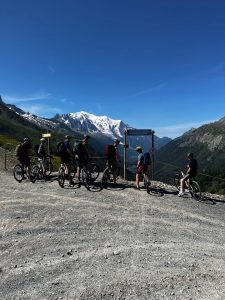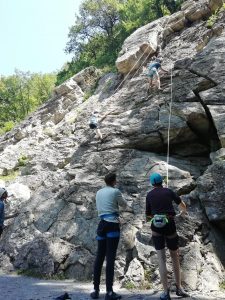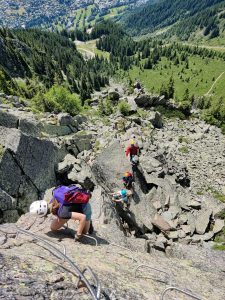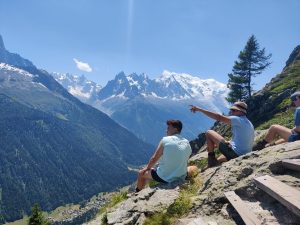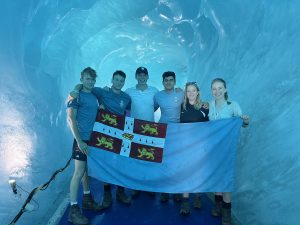Following the completion of their challenging Annual Deployment Exercise (ADX), officer cadets from Cambridge UOTC left Cambridge Army Reserve Centre at 3am 9th July and headed for Ex CHAMONIX BLUE: a multi-sport, six-day adventurous training expedition in the French Alps. We arrived at Dover in the early hours of Sunday morning and landed in Calais at 6am. After a further 17-hour drive, we reached our base for the week, the Campsite Mer de Glace in Chamonix, at 11pm.
Once at the campsite, the tired cadets were overjoyed to see that the advance party had also been hard at work, setting up tents across two camps. Exhausted from a long day of travelling, we had a headtorch-lit familiarisation of the campsite then crawled into our sleeping bags to get some well-earned rest before the week’s activities began.
Like previous adventurous training expeditions, each day we had to be ready to eat breakfast by 7:30am, free to get up on our own timescale as long as we met this timing. However, this was slightly different to our AT in Wales or Scotland: we woke up to freshly baked breads, croissants and pan-au-chocolat, a sure-fire way to ensure morale is high at the start of every day. Once every last crumb had been scoffed, we split into groups for each activity and departed by 9:00am.
The Expedition was designed to allow all cadets to sample a range of different adventurous training opportunities, with the intent that cadets could then continue to develop their standard in those activities that they enjoyed, with potential to work towards leadership qualifications in the given area. We could trial:
+ Mountain-biking
+ Mountain Trekking
+ Via ferrata
+ Rock-climbing
Participating in each of these areas also allowed us to build experience which we could add to our logbooks which will facilitate attendance on leader/supervisor courses in the future. One of our senior officer cadets, Jess, who helped lead the mountain-biking this year, exemplifies the pipeline we are encouraged to follow: “This is my second trip to Chamonix, the first allowed me to gain a beginner foundation qualification that let me instruct this year. This full circle wouldn’t have been possible without the Ulysses funding that makes these trips happen”.
Via Ferrata
Unlike any AT on offer in the UK, all officer cadets were given the opportunity to experience Via Ferrata, mostly for the first time. Although this does not include progression towards a qualification it did not disappoint. The views were stunning, the experience unlike any other, and both the skills and personal discipline learned are transferrable to plenty of other outdoor pursuits, especially climbing. All of us were pushed outside of our comfort zone and expanded our understanding of our own physical and mental limits.
Via Ferrata translates to “iron way” in Italian and originates from WW1. With a large number of troops focussed on the threat of Russia, the Austro-Hungarian defensive line was retracted and reformed running through the Dolomites, meaning that battles were brought into the hostile conditions of the mountain region. To aid in the movement of troops, permanent metal wires, ladders and metal struts were fixed to the cliffs, allowing soldiers to move up sheer rock faces with relative safety and speed. Via ferrata paths then began to be used to transport troops to otherwise inaccessible locations within the mountains, allowing them to carry heavy kit whist attached to the very mountains they were scaling.
Knowing that the same activity we were participating had been a necessity for military personnel in the past, and imagining what it could have been like to not only be outside of your comfort zone hanging from a sheer rockface, but to be doing so under threat of gunfire whilst carrying heavy kit, made the experience even more awe-inspiring. Nowadays, via ferrata includes clipping yourself into steel cables and climbing up steel ladders integrated into the rockface, as well as side stepping across rockfaces and crossing rope bridges. It forces you to have complete faith in both your equipment and yourself; at the end of the day, that’s all that’s keeping you safe 2000-3000m up.
Rock Climbing
The group in Chamonix had a large range of climbing experience, with several cadets already holding qualifications and working towards becoming supervisors. As well as this, climbing had the largest turnover of cadets, with new members every day. Therefore, the climbers went to Le Fayet which provided a range of climbs including a small beginners crag and challenging 5C overhang.
Each group quickly picked up the figure of eight rethread and the stopper knots as well as learning to belay. After this, we were ready to climb.
Whether overcoming an extreme fear of heights by simply getting on the wall to speed climbing the more challenging routes, everyone found challenge in climbing. Furthermore, it forces trust in other members of the team, especially when several of us had only just learned how to belay and were being partially blinded by the dazzling French sun. The importance of height and weight differences in belay pairs also ensured that cadets thought out their climbing orders and considered who might need an anchor when belaying. It’s always fun to watch a smaller belayer get tied to a nearby rock, or alternatively fly a few inches off the ground when their climber slips.
Mountain Biking
Jess Cunliffe, one of our Junior Under Officers, helped to run the mountain biking this year after completing her qualification since the last AT package. She described the experience as follows:
“During my second expedition to Chamonix, I joined my fellow officer cadets from the Cambridge University Officer Training Corps in engaging in exhilarating mountain biking activities. Grateful for the support from Ulysses Trust, which allowed me to complete a mountain bike foundation course the previous year, I acquired the essential skills and confidence to pursue a military Mountain Bike Leader qualification with JSMTC, which I successfully achieved.
Throughout our time in Chamonix, I undertook the responsibility of instructing six officer cadets each day. Guiding them through skill-building exercises and fostering their confidence in mountain biking, I found the experience to be deeply fulfilling. Reflecting on my journey from being a student just a year earlier, the sense of completion felt like a significant milestone.
Ulysses Trust’s indispensable support plays a pivotal role in making these expeditions feasible, granting students the opportunity to cultivate invaluable leadership and practical skills that might otherwise remain out of reach. With each passing day, I encountered a fresh group of students, each possessing varying levels of mountain biking experience and enthusiasm. As the week unfolded, I had the privilege of nurturing beginners who had never ridden a bike before. Through patient instruction on fundamental riding techniques and comprehensive insights into bike components, we collectively built a skill set that empowered us to embark on scenic rides spanning the valley, encompassing the breathtaking expanse from Vallorcine to Servoz.
The diverse terrain of the region exposed our officer cadets to a spectrum of challenges, igniting their enthusiasm and compelling them to give their utmost effort. The pinnacle of our journey arrived on the final day of the expedition, when six accomplished officer cadets tackled the downhill sections of Vallorcine, descending from an elevation of 5297 feet amidst the stunning backdrop of the Swiss border. The day proved to be an exhilarating endpoint to the week, thoroughly enjoyed by all.
In closing, I extend my heartfelt gratitude to the Ulysses Trust for their unwavering support, which continuously empowers officer cadets like me. The trust’s contribution to CUOTC significantly enhances our confidence, hones our skills, and gifts us enduring memories that will undoubtedly shape our future careers.”
Mountain Trekking
On the first day, the trekking group took the train to Argentiere and began a gentle route aimed to allow a reintroduction to higher altitude hiking, choosing the path that wound gradually up out of the valley. However, the ambition and positive attitude of the group meant that the cadets and staff agreed to push up and bag not one, but two peaks less than 24 hours into the stay in Chamonix. Once we reached the first summit, there was a path of ladders up the rockface – not dissimilar to via ferrata – that lead another 200m up to the second peak. After several long days of travelling, this leg stretch was challenging but extremely rewarding, both in scenery and quality mountain days.
On the second day, the new trekking group was composed of more unaccustomed hikers, and so a route was chosen that while still including plenty of elevation change, also ensured gorgeous views and natural distractions en route. Again, the cadets got the train to Argentiere and set off heading back towards Chamonix. After a quick ascent to halfway up the valley, the hike snaked through the forest. We passed several waterfalls and used them to cool off as the temperature rose.
To end the trekking on a high, the final day was a hike up to the Mer de Glace. The Mer de Glace is the largest glacier in France, over 7km long and 200m deep. For this trek, rather than getting the train, we set off straight from camp, staring at the side of the valley knowing that the glacier was on the other side of the peak we were looking up at. After a short detour around the fallen trees, we began the ascent, zigzagging up the mountain for 4 hours – with a short break in the middle at an isolated café with great views and even better milk shakes. Once we reached the Mer de Glace, there was then a 430-step staircase descent to enter the glacier itself. As the glacier continues to melt this set of stairs grows, with thought-provoking dated signposts displaying the rate of the melt. Once inside the glacier, there were ice sculptures, such as a fully carved ice bar and two thrones. An incredible experience and definitely a brilliant way to top of a week of great treks.
Camp Life
Ex CHAMONIX BLUE exposed us not only to the adventurous activities themselves, but also to the planning that AT expeditions require. The expedition used two self-catered campsites in the Chamonix valley, meaning that each day two pairs of cadets were chosen to cook for our respective camps. We had to plan a meal within our given budgets, buy the ingredients ourselves and then cook on gas barbeques once we had returned from a hard day’s training. Not only did this help develop an understanding of planning, delegation, time-management and teamwork, but this also created a healthy competition between the cadets for who could create the best dinner. Close contenders were the three course ‘boujee’ barbeque – including a camembert starter, burgers, hot-dogs and veggie skewers, followed by a cheese board and chutneys – and the loaded nacho and fajita night.
The Impact of this Trip
Mental and Physical Courage
All officer cadets were exposed to a new form of risk. Whether height, speed, exposure, trusting their equipment and their team or overcoming a personal fear, each cadet was challenged to reflect on their own perception of their mental boundaries, and then re-establish them after they had undertaken a challenging activity. Although via ferrata may seem the most mentally challenging activity due to the exposure, height and novelty, those cadets who tried mountain biking for the first time emerged slightly scratched and bruised but always grinning.
Inspiration
This encouragement of independent planning, during “yet another quality AT trip with the UOTC” (OCdt Geelan), has led to several cadets planning their own adventurous training for the year to come. From rock-climbing to trekking, cadets have been inspired!
We are incredibly grateful for the help that the Ulysses Trust provided to us, the direct impact of which was that one of our cadets became the first member of his family to ever need to order a passport; without the aid provided we would not have been able to set a price-point that allows all of our cadets to access these incredible opportunities. Ellie explained how she “would definitely recommend the trip to cadets in the future and hope to return myself next year!”.
First Hand Reviews:
As described by Officer Cadet Chris Denham, the expedition was “simply superb!”. One of our junior cadets, Kate, said “an amazing week! I got to try activities that put me out of my comfort zone, such as via ferrata and I really enjoyed them, changing what I thought my limits are”. For Tom, this was also a new experience: “This was my first trip away with the OTC and it was far from what I expected (in a good way!). I did two mountain biking day and am now looking at doing my foundation course. Looking forward to the next trip.”
“I would never have experienced mountain biking if it weren’t for this AT experience. All the activities were challenging and pushed me to keep going. I learnt a lot and had a great time, it was incredible”.
Anonymous
“My last trip away with the OTC, I was able to try mountain biking and via ferrata for the first time which was amazing. I would not have got the opportunity otherwise.”
OCdt Pippa Slater
“A fantastic, varied and challenging week in which the OCdts flourished as they pushed themselves on the mountains, and in their culinary endeavours on camp!”
2Lt Phoebe Hall

